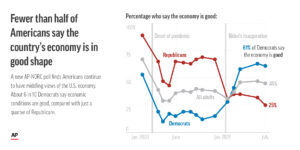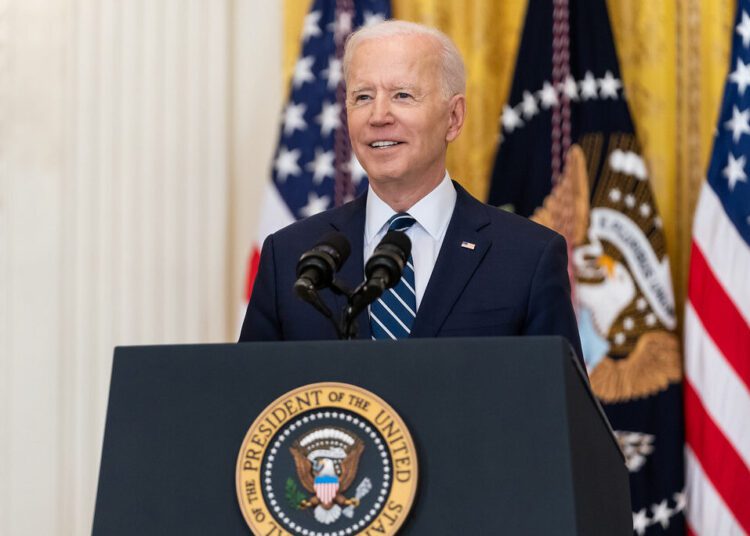WASHINGTON – President Joe Biden is banking on the idea of making life more affordable for middle-class families – and that’s where the recent bout of inflation poses both a political and an economic risk.
The US economy may be poised for the fastest growth since 1984, but many Americans are not feeling all that confident about the economy, according to a new poll from The Associated Press-NORC Center for Public Affairs Research.
Republican lawmakers have attacked the Biden administration over inflation as the country reopened from the coronavirus pandemic, and feelings about the economy are settling along partisan lines.
Fewer than half, 45%, judge the economy to be in good shape, while 54% say it´s in poor shape. Views are similar to what they were in AP-NORC polls in June and in March, despite increases in vaccinations and the flow of aid from Biden’s $1.9 trillion coronavirus relief package.
The results suggest that Americans not only filter their thoughts about the economy through their politics but also see uncertainty as the country is still 6.8 million jobs below pre-pandemic levels.

John Novak, a 52-year-old school maintenance worker from Hudson, Wisconsin, is tired of seeing higher gasoline prices and six-month waits to buy a refrigerator. He blames the size of the aid package.
“Everything just costs more, and no one´s really making more other than if you get government money, which I did get some, but I´d rather have prices lower,” said Novak, who voted for President Donald Trump last year.
“It´s a tough spot. We´re kind of coming out of this pandemic and then when you pour too much money in you just can´t get enough of what you want.”
The Biden administration is keenly aware that inflation is a potent weapon that could be used politically against Democrats. While pledging to stay vigilant against price increases, officials say that the recent burst reflects the complex nature of restarting an economy that had been shuttered because of the pandemic and that inflation will only be elevated temporarily as a result.
There are some early signs of inflation lessening as the Manheim Used Vehicle Value Index fell during the first 15 days of July. Meanwhile, the economy has been adding nearly 605,000 jobs a month since Biden became president and economic growth is tracking above 7%.
“There’s no better way to contradict false messaging than by posting strong performance,” said Jared Bernstein, a member of the White House Council of Economic Advisers. “When you´re in the midst of a recovery with these kinds of numbers, I think it makes it harder for people on the other side to paint a false version of reality.”
Still, political identity is infusing views on the economy. About 6 in 10 Democrats call the economy good, while three-quarters of Republicans say conditions are poor.
That spills over to how Americans are judging Biden’s handling of the economy, with 52% approving and 47% disapproving overall. Biden´s approval rating overall is somewhat higher, at 59%, as is his approval rating for his handling of the COVID-19 pandemic, at 66%.
About 8 in 10 Democrats, but only about 1 in 10 Republicans, approve of Biden on the economy. Republicans are somewhat more likely to approve of Biden’s handling of the coronavirus pandemic (about 3 in 10 do) and even issues like health care and infrastructure (about 2 in 10 do).
Federal Reserve officials have estimated that the economy could grow at roughly 7% this year. But the U.S. central bank is also tasked with keeping inflation at a 2% target, and there are signs that the pressures pushing up prices have yet to fade as there are limited supplies of houses, autos and the raw materials used by many manufacturers.
The solid demand is supposed to lead to additional supply, which can then help inflation ease. But the outlook for inflation that Fed Chair Jerome Powell considers to be temporary has become somewhat more hazy.
Consumer prices jumped 5.4% for the year ended in June. Stripping out volatile food and energy costs, they’re up 4.5%, the biggest increase since 1991.
“We don´t have another example of the last time we reopened a $20 trillion economy,” Powell told the Senate Banking, Housing and Urban Affairs Committee this month. “We´re humble about what we understand.”
Joseph Smith, 72 and a retiree in Alexandria, Virginia, said he worries that the constant focus on inflation by Powell and Republicans has been spooking consumers.
“The Fed is sort of hindering the economy by talking about inflation all the time,” said Smith, who supported Biden last year and feels the president has brought “real stability” to the government with his straight talk on the coronavirus and the economy.
Republican lawmakers have blamed Biden’s spending for the inflation and say his plans for another $4.1 trillion in new spending to be paid for through taxes on the wealthy and corporations will only cause prices to keep rising.
They frame it as a return to the runaway price increases of the 1970s, even though economists who are concerned about inflation say that’s not the case. But the message is connecting with Republican voters.
“As Joe Biden´s inflation crisis rages, he just can´t stop fueling it with more reckless government spending,” said Florida Sen. Rick Scott, who is chairman of the National Republican Senatorial Committee. “Americans are experiencing 1970s-style inflation again, and it´s because of Joe Biden´s failed economic policies.”
Those kinds of criticisms are being echoed by voters in a sign of the challenge before Biden as he tries to broaden the appeal of his policies.
Gregory Holman, 58, a hotel property manager in Grants Pass, Oregon, said he couldn’t find an affordable used car. He said it was the fault of too much government spending and graded Biden accordingly.






Discussion about this post